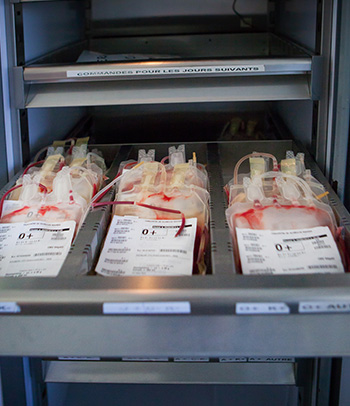A surprising number of people don’t know their blood type, but knowing your blood type may be more important than you think.
Do you know your blood type? If you don’t, you’re not alone. According to the American Red Cross, a surprising number of people don’t know their blood type.
Learn more about blood types, the importance of knowing yours, and how it connects to your health and wellness.
What Are Blood Types?
There are four major blood groups – A, B, AB and O. These four groups are determined by the presence or absence of two antigens, A and B, on the surface of your red blood cells. So, for example, if your blood has A antigens, you have an A blood type. If your blood has B antigens, you have a B blood type. If you have both A and B antigens, you have an AB blood type, and if you have neither A nor B antigens, then you have an O blood type.
These four groups are then broken down a step further by looking for a protein called the Rh factor. When the Rh factor is present, you get positive (+) blood, and when it’s absent, you get negative (-) blood.
Together, these two things create the eight most common blood types – A+, A-, B+, B-, O+, O-, AB+, AB-
There are 600 other known antigens, the presence or absence of which create “rare blood types” that may be specific to certain ethnic or racial groups.
How Can I Find Out My Blood Type?
Your blood type is inherited from your parents, just like your eye color for example. Whether you’re A, B, AB or O is based on the blood types of your parents.
To determine your blood type, you’ll have to get your blood drawn. From there, health care providers will use your blood sample to complete a test called ABO typing to find out if your blood is A, B, AB or O. To get the Rh typing, they’ll use the blood sample to check if you have Rh factor on the surface of your red blood cells. This will determine if your blood is positive or negative.
Learn more about blood typing tests and how your blood type is determined.
Why Is It Important to Know My Blood Type?
There are several health-related reasons why knowing your blood type is important, including:
- Safe blood transfusions – Safe blood transfusions depend on careful blood typing and cross-matching. Since the presence of certain antigens can trigger a patient’s immune system to attack the transfused blood, you have to know what blood types are safe for you in case of an emergency. For example, if you have type A blood, you can only receive blood types A and O during a transfusion. If you’re Rh-negative, you can only receive Rh-negative blood. When there is time, both patient and donor blood are cross matched to look for incompatibility. To learn more about safe blood transfusions, check out this helpful infographic by the American Red Cross.
- Blood donations – Millions of people need blood transfusions each year for reasons like emergencies, serious injuries, cancer treatments, and more. When you donate blood, you’re providing life-saving blood to others. Having enough supply of blood types is important to ensure patients can get the blood they need.
- Type O negative blood donors are called “universal donors” because type O negative blood can be given to a person with any blood type in an emergency, which makes it an important blood type to collect.
- According to the American Red Cross, approximately 51% of African Americans and 57% of Hispanics are type O. Diverse blood donations are critical to meet the constant need for blood.
- Learn more about the blood donation process and how to schedule a donation through the American Red Cross.
- Medical reasons – Your blood type might put you at risk for certain medical conditions.
- Heart disease – According to Penn Medicine, a gene called the ABO gene, present in people with A, B or AB blood types, may put you at greater risk for a heart attack or coronary heart disease than those who don’t have that gene. A heart-healthy lifestyle is particularly important for people with Type A, B and AB blood.
- Cancer – Studies have found that people with Type A or Type AB blood are at higher risk for gastric cancer, and the ABO gene may increase the risk for pancreatic cancer.
- COVID-19 – Type A blood may lead to a higher risk for COVID-19 infections. Type O blood may be somewhat less likely to test positive and have less severe disease from a COVID-19 infection.
- Even with these potential connections between blood type and certain health conditions, it doesn’t mean these conditions will develop based on blood type alone. However, being informed can help you make good lifestyle choices for your overall health and wellness.
Now that you’re aware of the importance of knowing your blood type, it’s time to learn yours!







